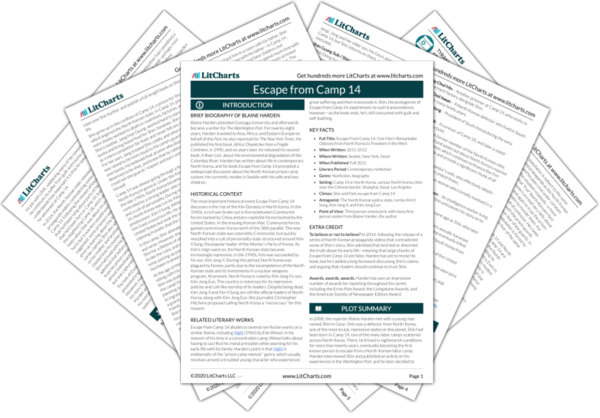In the final chapters of Escape From Camp 14, the key theme is guilt. During his time in Camp 14, Shin In Geun has done some things that, on the surface, seem almost unforgiveable: he’s beaten up little children, he’s stolen food from starving people, and he’s ratted out his mother and brother to the prison guards, leading directly to their murder. Because of his constant sense of guilt, Shin has also concealed various elements of his time in prison camp: at first, he lied to hundreds of journalists, activists, and counselors about his role in his mother and brother’s executions, and even after Escape From Camp 14 was published, he recanted elements of his story, admitting that he also signed a document implicating his family members in a murder they didn’t commit. Blaine Harden argues that Shin shouldn’t be held strictly accountable for his actions, since he was a brainwashed child, and didn’t know any better. He further argues that Shin shouldn’t be criticized too harshly for lying about his past—many traumatized people do exactly the same thing in order to preserve their own sanity. However, the moral question of how to judge Shin is too big for the book—or any book—to discuss. Instead of trying to address whether Shin is guilty or innocent of his crimes, the book addresses the ways that Shin tries—and, in many ways, fails—to come to terms with his dark past.
Through the character of Shin, Escape From Camp 14 shows how guilt can consume a human being. Perhaps more than any single factor, Shin’s guilt prevents him from living a normal life. After he escapes from Camp 14, Shin realizes that he was responsible for his brother and mother’s unjust execution. Ashamed of what he did, he begins to suffer from nightmares and panic attacks, to the point where he can barely make it through a normal day. But Shin’s guilt doesn’t just prevent him from living a normal life; it also bars him from speaking out against the evil he witnessed at Camp 14. After leaving Camp 14, Shin expresses a desire to become a human rights activist, so that other people never have to experience the pain that he experienced. But he quickly becomes reluctant to speak out against the North Korean prison camp system, since doing so would involve telling the truth about his own role in the camp’s murderous policies. Rather than come to terms with his past, Shin at first lies about his role in his mother’s murder, and even after he admits the truth, he refuses to speak at length about Camp 14.
Escape From Camp 14 thus comes to a depressing conclusion about guilt: there’s not always a cure for it. Shin wants to speak out against the prison camp system—in some ways, he believes that by doing so, he can redeem himself for his past behavior. But at the same time, he doesn’t feel comfortable speaking out until he comes to terms with his past behavior. As Blaine Harden points out, many real-life stories about the horrors of prison camp (i.e., the ones that end up getting published) end on a note of optimism and transcendence—but of course, there’s no guarantee that they should. Many survivors never get over what they did to survive during their time in prison camp—their lives are difficult, endless struggles with their own consuming guilt.
Guilt ThemeTracker

Guilt Quotes in Escape from Camp 14
In writing this book, I have sometimes struggled to trust him. He misled me in our first interview about his role in the death of his mother, and he continued to do so in more than a dozen interviews. When he changed his story, I became worried about what else he might have made up.
Shin said he did not expect forgiveness for what he was about to disclose. He said he had not forgiven himself. He also seemed to be trying to do something more than expiate guilt. He wanted to explain—in a way that he acknowledged would damage his credibility as a witness—how the camp had warped his character.
It was Shin's first exposure to sustained kindness, and he was grateful beyond words. But he also found it puzzling. He had not trusted his mother to keep him from starving.
Astonishing himself and his seamstresses, Shin lost his composure. He grabbed a large wrench and swung it as hard as he could, trying to crack open Gong's skull.
At the mention of his father’s name, Shin became angry. Although he had tried to repress it, the resentment he felt toward his mother and brother had grown since their deaths. It had poisoned his feelings for his father. Shin wanted nothing to do with him.
He began thinking about escape. Park made those thoughts possible. He changed the way Shin connected with other people. Their friendship broke a lifelong pattern—stretching back to Shin's malignant relationship with his mother—of wariness and betrayal.
Shin did not have to worry about brokers, and his physical health was relatively good after a half year of rest and regular meals in the consulate in Shanghai. But his nightmares would not go away.
[Shin] told a story about his escape that was short, sketchy, sanitized—and largely incomprehensible to someone who was not steeped in the details of his life.
"My story can be very heartbreaking," he said, wrapping up the session after about fifteen minutes. "I don't want you to be depressed." He had bored and baffled his audience.
That evening, his listeners squirmed in their pews, their faces showing discomfort, disgust, anger, and shock. Some faces were stained with tears. When Shin was finished, when he told the congregation that one man, if he refuses to be silenced, could help free the tens of thousands who remain in North Korean labor camps, the church exploded in applause.
In that speech, if not yet in his life, Shin had seized control of his past.
















